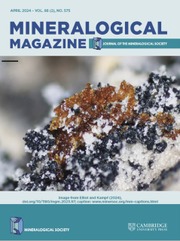Crossref Citations
This article has been cited by the following publications. This list is generated based on data provided by Crossref.
BOOMERI, Mohammad
MIZUTA, Toshio
NAKASHIMA, Kazuo
ISHIYAMA, Daizo
and
ISHIKAWA, Yohei
1997.
Geochemical characteristics of halogen-bearing hastingsite, scapolite and phlogopite from the Sangan iron skarn deposits, northeastern Iran..
JOURNAL OF MINERALOGY, PETROLOGY AND ECONOMIC GEOLOGY,
Vol. 92,
Issue. 12,
p.
481.
Yavuz, Fuat
2007.
WinAmphcal: A Windows program for the IMA‐04 amphibole classification.
Geochemistry, Geophysics, Geosystems,
Vol. 8,
Issue. 1,
BANNO, Yasuyuki
MIYAWAKI, Ritsuro
MATSUBARA, Satoshi
SATO, Eriko
NAKAI, Izumi
MATSUO, Gen-ichiro
and
YAMADA, Shigeo
2009.
Potassic-ferropargasite, a new member of the amphibole group, from Kabutoichiba, Mie Prefecture, central Japan.
Journal of Mineralogical and Petrological Sciences,
Vol. 104,
Issue. 6,
p.
374.
Kaneva, Ekaterina
Radomskaya, Tatiana
Shendrik, Roman
Chubarov, Victor
and
Danilovsky, Victoria
2021.
Potassic-Hastingsite from the Kedrovy District (East Siberia, Russia): Petrographic Description, Crystal Chemistry, Spectroscopy, and Thermal Behavior.
Minerals,
Vol. 11,
Issue. 10,
p.
1049.
Enami, Masaki
Taguchi, Tomoki
Kouketsu, Yui
Michibayashi, Katsuyoshi
and
Nishiyama, Tadao
2022.
Formation process of Al-rich calcium amphibole in quartz-bearing eclogites from The Sulu Belt, China.
American Mineralogist,
Vol. 107,
Issue. 8,
p.
1582.



